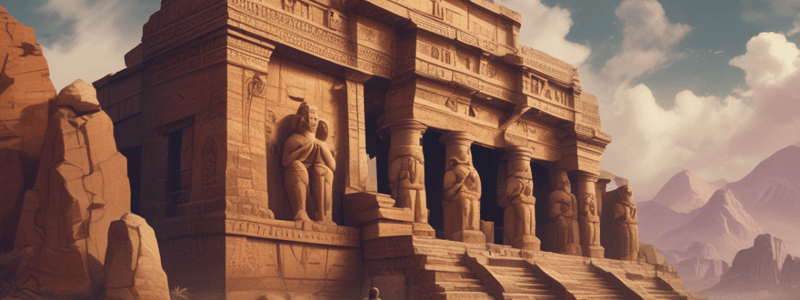Podcast
Questions and Answers
What was a significant contribution of Ancient Greece to political systems?
What was a significant contribution of Ancient Greece to political systems?
- Initiation of the Crusades
- Creation of the Code of Hammurabi
- Development of democracy in Athens (correct)
- Establishment of feudalism
Which of the following events is most associated with the decline of learning and trade?
Which of the following events is most associated with the decline of learning and trade?
- The Industrial Revolution
- Fall of the Roman Empire (correct)
- The Renaissance
- The Age of Exploration
What was a major result of the Reformation?
What was a major result of the Reformation?
- Revival of classical learning
- Establishment of the American colonies
- Emergence of new Christian denominations (correct)
- Strengthening of the Catholic Church's authority
Flashcards are hidden until you start studying
Study Notes
Ancient Civilizations
- Mesopotamia:
- Located in present-day Iraq
- Invented writing (cuneiform)
- Developed city-states (e.g., Babylon, Ur)
- Created code of laws (Code of Hammurabi)
- Ancient Egypt:
- Located in northeastern Africa
- Built pyramids (e.g., Great Pyramid of Giza)
- Developed hieroglyphic writing
- Practiced mummification
- Ancient Greece:
- Located in southeastern Europe
- Developed democracy in Athens
- Made significant contributions to philosophy (e.g., Socrates, Plato, Aristotle)
- Achieved advancements in theater (e.g., tragedy, comedy)
- Ancient Rome:
- Located in central Italy
- Developed republic and empire systems
- Built extensive infrastructure (e.g., roads, aqueducts)
- Spread Latin language and culture throughout Europe
Medieval Period
- Fall of the Roman Empire:
- Led to a decline in trade, commerce, and learning
- Marked the beginning of the Middle Ages
- Feudalism:
- System of lords and vassals
- Characterized by a hierarchical society
- Crusades:
- Series of military campaigns to reclaim the Holy Land
- Led to increased trade and cultural exchange between East and West
- Rise of Nation-States:
- Emergence of powerful kingdoms (e.g., England, France, Spain)
- Led to the decline of feudalism and the rise of centralized governments
Early Modern Period
- Renaissance:
- Cultural and intellectual movement in Europe
- Characterized by a revival of classical learning and art
- Age of Exploration:
- European explorers traveled to the Americas, Africa, and Asia
- Led to the establishment of colonies and the transfer of goods, ideas, and cultures
- Reformation:
- Protestant movement that challenged Catholic Church authority
- Led to the emergence of new Christian denominations (e.g., Lutheranism, Calvinism)
- Enlightenment:
- Intellectual movement that emphasized reason, individualism, and democracy
- Influenced the development of modern political and social structures
Modern Period
- Industrial Revolution:
- Transition from manual labor to machine-based manufacturing
- Led to the development of new technologies and the growth of cities
- Nationalism and Imperialism:
- Rise of nationalist movements and the expansion of European empires
- Led to conflicts and competitions between nations
- World Wars:
- Global conflicts that involved multiple nations and ideologies
- Led to the reorganization of the world order and the rise of new global powers
- Cold War:
- Ideological and geopolitical conflict between the United States and the Soviet Union
- Characterized by proxy wars, espionage, and a nuclear arms race
Ancient Civilizations
-
Mesopotamia, located in modern Iraq, is considered the cradle of civilization.
-
Cuneiform writing was one of the first writing systems; it was created by the Sumerians.
-
Key city-states included Babylon and Ur, pivotal in trade and culture.
-
The Code of Hammurabi established one of the earliest sets of laws.
-
Ancient Egypt, situated in northeastern Africa, is renowned for its monumental architecture.
-
The Great Pyramid of Giza stands as a testament to engineering prowess.
-
Hieroglyphic writing served as a sophisticated communication method with symbolic characters.
-
Mummification practices reflect beliefs in the afterlife and preservation of the body.
-
Ancient Greece, in southeastern Europe, is the birthplace of democracy, particularly in Athens.
-
Philosophers such as Socrates, Plato, and Aristotle shaped Western thought and ethics.
-
Innovations in theater introduced genres of tragedy and comedy that are still influential today.
-
Ancient Rome, centered in modern Italy, transitioned from a republic to a vast empire.
-
Extensive infrastructure, including roads and aqueducts, facilitated trade and military movement.
-
Latin emerged as the dominant language, influencing many modern European languages and cultures.
Medieval Period
- The Fall of the Roman Empire resulted in diminished trade, commerce, and intellectual growth, marking the start of the Middle Ages.
- Feudalism structured society into a hierarchy of lords and vassals, defining land ownership and loyalty.
- The Crusades were military expeditions aimed at reclaiming the Holy Land, enhancing trade and cultural exchanges between Europe and the Middle East.
- The rise of nation-states like England, France, and Spain led to stronger centralized governments and reduced feudal influence.
Early Modern Period
- The Renaissance sparked a revitalization of classical learning and artistic expression in Europe.
- The Age of Exploration saw European explorers discovering new lands, leading to colonization and cultural exchanges.
- The Reformation challenged the Catholic Church’s authority, resulting in the formation of various Protestant denominations like Lutheranism and Calvinism.
- Enlightenment thinkers promoted reason, individual rights, and democratic principles, influencing modern governance.
Modern Period
- The Industrial Revolution transformed economies from agrarian to machine-based production, heralding new technologies and urbanization.
- Nationalism fueled movements for independence and the expansion of European empires, resulting in international tensions.
- World Wars I and II reshaped global power dynamics, with massive military engagements and ideological conflicts.
- The Cold War involved a prolonged ideological struggle between the United States and the Soviet Union, characterized by proxy conflicts and a nuclear arms race.
Studying That Suits You
Use AI to generate personalized quizzes and flashcards to suit your learning preferences.




